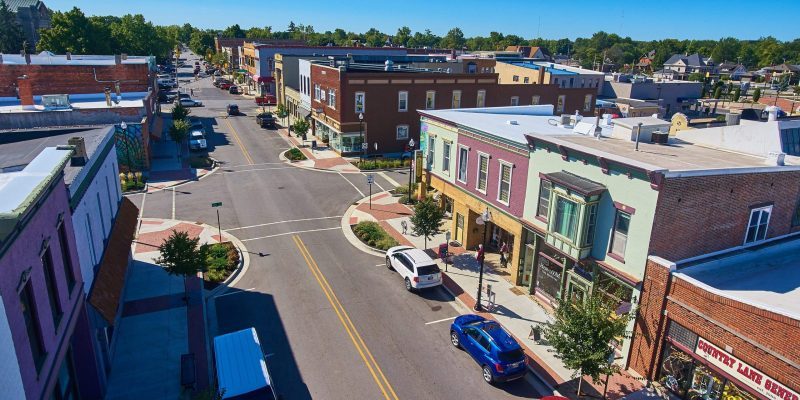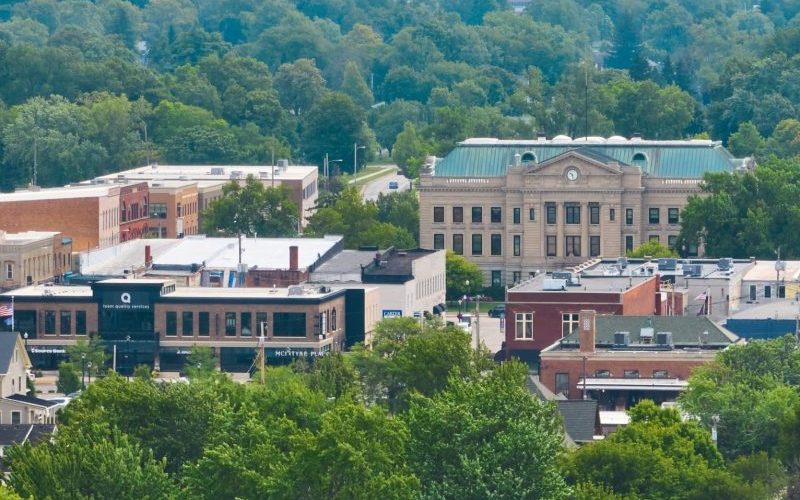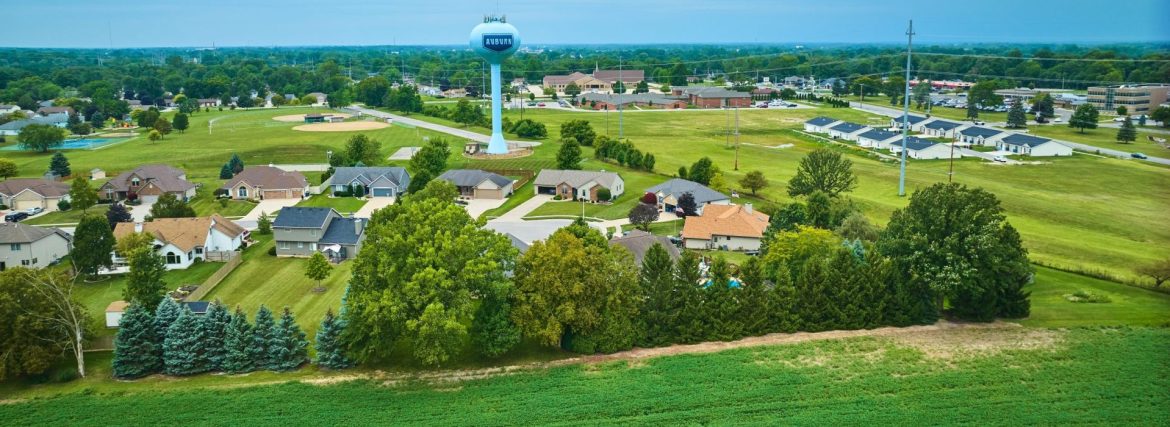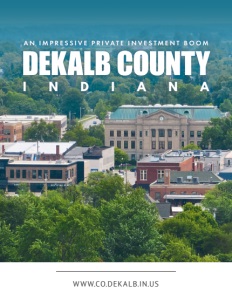An Impressive Private Investment Boom
With a commitment to sustainability and a keen infrastructure focus, growth beckons
DeKalb County, Indiana, is experiencing unprecedented economic growth, with a record $760 million private investment in 2024. This surge in activity is primarily driven by expanding existing industries and strategic community development initiatives. As businesses grow and new developments emerge, local leaders work collaboratively to address housing shortages, workforce development, and infrastructure improvements. The county’s commitment to sustainable progress and long-term prosperity is evident in the initiatives undertaken across Auburn, Garrett, and Butler, each uniquely contributing to the region’s overall advancement.
Economic growth across DeKalb County
Anton King, President and CEO of the DeKalb County Economic Development Partnership, highlights the county’s historic level of investment. “We’ve had roughly $760 million of new private investment, a record year for our organization. The majority of this comes from expanding existing businesses, although we have also attracted some new industries,” he says. He emphasizes that this success has shifted focus towards broader community development initiatives, such as housing and broadband infrastructure. Additionally, the county has been working closely with business owners to ensure that these new developments align with long-term economic sustainability and do not disrupt the existing community character.
Mayor Dave Clark of Auburn shares his perspective on the rapid expansion in his city. “We’ve seen significant growth from 2021 through 2023, and that momentum continues. We are building a 131-home subdivision, and developments such as Sonic and Mike’s Car Wash are set to begin construction soon,” Mayor Clark says. Additionally, Auburn is working on a mixed-use development that includes multi-family housing, townhomes, a hotel, big-box stores, and restaurants. Businesses such as Verizon, Chipotle, Panda Express, Bell Tire, and Texas Roadhouse have already set up shops in the area, and more commercial investments are being made in the pipeline. “What we are seeing is not just expansion, but the creation of a more connected community where residents have access to both essential and lifestyle services right in their neighborhood,” he adds.
Mayor Todd Fiandt details ongoing housing expansion and significant industrial investments in Garrett. “We’ve seen continuous housing growth over the past eight to nine years, with 129 homes at the city’s south end already sold and a new 41-home development underway. We also have a Walmart distribution center under construction and are in final discussions with an international company that plans to make a significant investment here,” Mayor Fiandt says. He points out that attracting new businesses is not just about bringing in revenue but ensuring that jobs are available for the local workforce. “We are working closely with educational institutions and training programs to create a workforce ready to step into these new roles, keeping our economic momentum strong,” he explains.

Butler, on the other hand, faces different economic realities. Mayor Mike Hartman explains, “Unlike Auburn and Garrett, Butler has struggled with large-scale housing developments. However, we’ve taken steps to reclaim and auction off vacant lots for new housing. We’ve also initiated a brownfield redevelopment project that could lead to a 225,000-square-foot speculative building, attracting more investment,” Mayor Hartman says. He emphasizes that a strategic approach is needed for small towns like Butler. “While we may not have large-scale projects like other cities, we are focusing on leveraging existing resources and creating an environment that attracts small-to-medium businesses looking for a community-centric location,” he says.
Making homeownership more accessible
All three mayors agree that housing is the most pressing issue in DeKalb County. “The nationwide housing shortage is hitting us hard. Material costs have doubled since COVID-19 and interest rates reached 8%, making it difficult for developers,” Mayor Clark notes. Auburn, Garrett, and Butler are all working on strategies to incentivize developers through tax abatements and infrastructure investments. Mayor Clark also notes that these efforts include working with local banks to create mortgage assistance programs that make homeownership more accessible for first-time buyers.
Mayor Fiandt highlights a specific concern: senior housing. “We lack housing options for our senior citizens. A former client, a retiree from Auburn Foundry, searched for housing in DeKalb but moved to another county. That’s unacceptable—we need to provide more options for aging residents,” Mayor Fiandt says. He also suggests that mixed-use developments incorporating both senior housing and community centers could be viable, allowing for greater engagement and connectivity among different generations.
“We don’t have access to major highways like Auburn does, and builders prefer locations where they can construct 400 homes at once rather than smaller projects. Our best bet is redeveloping infill lots and repurposing existing structures,” Mayor Hartman explains. He also highlights a need for additional zoning flexibility, which could make it easier for smaller developments to gain approval.
Building a skilled workforce
In addition to housing, workforce development is a significant priority. King explains that DeKalb County’s largest industry is manufacturing, and local schools have responded by incorporating advanced manufacturing, welding, and building trades programs. “We’ve worked closely with junior highs and high schools to provide workforce training that aligns with industry needs. When new companies come in, we immediately connect them with school program directors to ensure a steady talent pipeline,” King says. He also emphasizes the importance of apprenticeship programs, which allow students to gain real-world experience while completing their education.

Childcare is another significant workforce challenge. “Many families struggle to find childcare, which impacts workforce participation,” King states. “We’ve formed a local coalition and hired a staff member to address this issue by identifying funding sources and expanding existing childcare services.” The county is also exploring employer-sponsored childcare programs, which would allow businesses to offer on-site childcare as a benefit to employees, helping to address a considerable pain point for working parents.
Modernizing utilities to support expansion
With rapid growth comes the need for improved infrastructure. Mayor Hartman highlights Butler’s efforts: “We’ve invested over $20 million in infrastructure projects since 2020, including a complete overhaul of our wastewater treatment plant and replacement of century-old water lines. These projects were long overdue.” He emphasizes that infrastructure is about roads, sewers, and digital connectivity. “Broadband expansion is a key focus for us moving forward, ensuring that all residents have reliable internet access,” he says.
Mayor Fiandt discusses Garrett’s proactive infrastructure investments. “We upgraded our water lines, expanded our electrical grid, and secured nearly $1 million in state funding for road repairs,” he says. With Walmart and other factories coming in, we must ensure we can support them.” He also mentions that investments in public transportation are being considered to connect residents to employment centers better.
Mayor Clark emphasizes Auburn’s long-term planning. “Both our water and sewer plants have ample capacity for future growth,” he says. “We’re continuously replacing old water lines and ensuring our infrastructure remains strong.” Auburn also invests in smart traffic management solutions to handle increased population density without significant congestion issues.
A unified approach to sustainable growth
As DeKalb County looks toward 2025 and beyond, leaders remain focused on sustainable growth. King emphasizes the importance of updating the county-wide comprehensive plan, last completed in 2017. “This plan will incorporate public input to guide land use and infrastructure development for the next 10 to 20 years,” he explains. With several communities having recently completed their strategic plans, the goal is to align these efforts and create a cohesive vision for the country’s future. This process presents a significant opportunity for reflection—evaluating past progress, defining priorities, and shaping what DeKalb County wants to become.
Mayor Clark echoes the importance of balancing development with preserving the city’s unique character. “We want to sustain our growth while maintaining the small-town atmosphere that makes Auburn special,” he says. This means continued investment in infrastructure, expanding community resources and ensuring that growth enhances, rather than overwhelms, the city’s historic charm. Auburn’s deep-rooted automotive history remains a point of pride, drawing visitors and strengthening the city’s identity.
Mayor Hartman highlights how even smaller communities play a role in DeKalb County’s broader success. “We may be a small town, but we have a big heart and strong ambitions,” he says. Strategic investments, such as the relocation of the International Monster Truck Museum, have helped put Butler on the map. “For a town of 2,700 people to bring in 10,000 visitors in a year—that’s a big deal,” Hartman adds. Efforts to revitalize the downtown area aim to attract small businesses and tourism further.
Mayor Fiandt stresses the value of regional collaboration. “No city operates in isolation—we have to work together across DeKalb County to create policies and incentives that benefit everyone, from businesses to families to retirees,” he says. Public-private partnerships play a critical role in securing funding for essential projects and ensuring that growth is both sustainable and inclusive.
Ultimately, DeKalb County’s future hinges on a shared vision that prioritizes economic sustainability, infrastructure resilience, and community well-being. Collaboration between local government officials, business leaders, and residents will be key to ensuring that the county continues to thrive. As Mayor Fiandt puts it, “We’re not just planning for today—we’re building a foundation for the next generation. And that takes all of us working together.”
AT A GLANCE
Who: Dekalb County, Indiana
What: A rapidly growing economic hub driven by record private investments, strategic infrastructure improvements, and collaborative efforts.
Where: Northeastern Indiana, bordered by Allen County to the south and Steuben County to the north, with Auburn as its county seat.
Website: www.co.dekalb.in.us
PREFERRED VENDORS/PARTNERS
FCI Construction, based in Auburn, Indiana, is a trusted construction manager specializing in commercial and industrial projects. They offer expertise in design-build, renovations, and new construction, delivering innovative solutions with a focus on quality and customer satisfaction. FCI prides itself on building strong structures — and even stronger relationships.
FCI Construction: www.fci.construction


